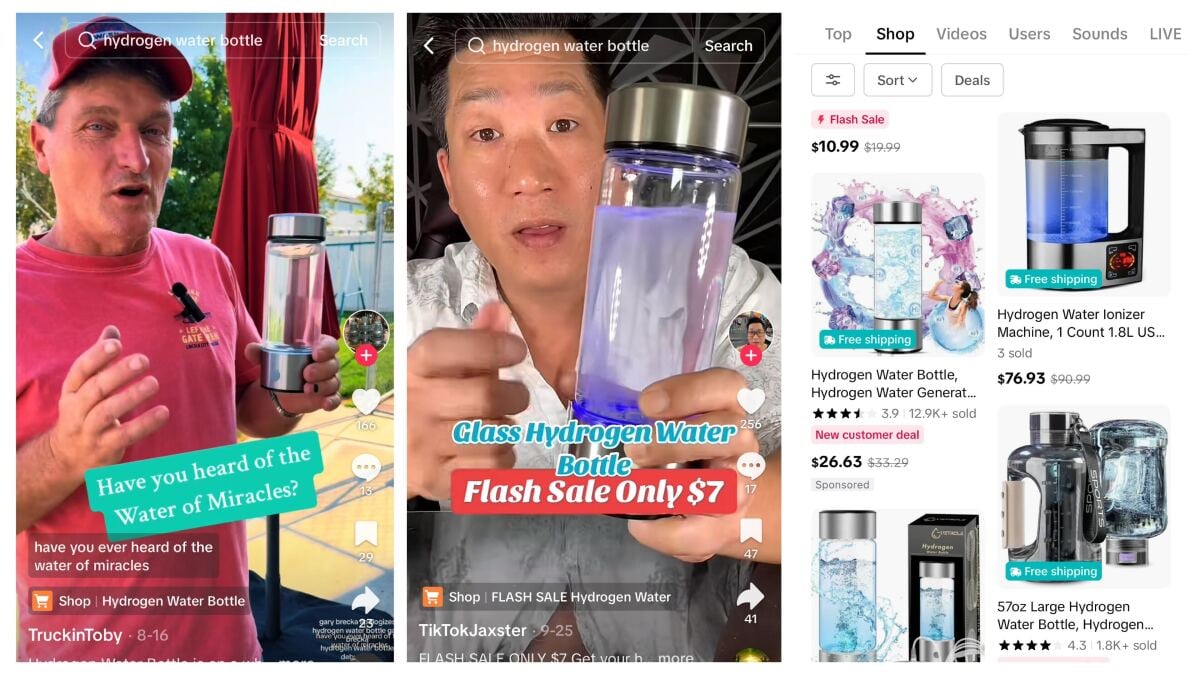There’s a new craze sweeping through TikTok concerning a new health trend: hydrogen water, with creators vying to sell the concept to followers alongside battery-powered water bottles that supposedly produce it. We’ve come to ask some hard, factual questions about this growing trend in this latest news post.
Hydrogen water – does it really hydrate the body better? Can it alleviate gut problems? Do these bottles truly manufacture hydrogen water?
For those unfamiliar with the term, hydrogen water refers to water that has been infused with hydrogen gas. Forces of chemistry explain that an average water molecule is comprised of one oxygen atom bound to two hydrogen atoms – this is denoted by its chemical formula: H2O. But this isn’t the same hydrogen associated with hydrogen water. Here, we are discussing a flammable, lightweight and gaseous form of hydrogen, displayed by two molecules of hydrogen bound together, and represented chemically as H2. A famous example that illustrated the flammability of this gas was the Hindenburg disaster.
In hydrogen water, the hydrogen gas is bubbled through the liquid itself. However – just as seen with soda – if the water sits out uncapped, the gas will escape and float into the air, eventually resulting in the water losing its carbonation. This mechanism, however, does not dispute the possibility of manufacturing hydrogen water. The question of whether it offers health benefits and its precise method of production in these TikToks videos are more challenging areas.
Looking through the #hydrogenwater hashtag reveals a plethora of reasons why creators are promoting hydrogen water. From taste to health claims, each seems to have a unique selling point. Some anecdotal benefits mentioned include the water’s hydration capabilities and its expected impact on gut health.
On the other hand, what is visibly clear is the sales pitch. Creators readily provide details on where to purchase the bottle, its cost, and why it’s superior to others in the market.
Human studies on the subject serve important roles in our understanding of the implications of hydrogen water. Presently, however, available studies on this direct matter remain extremely limited and inconclusive. Some studies have shown potential effects on areas like blood lipids or reported better quality-of-life scores among cancer patients after radiation therapy, but these experiments were conducted on small groups and don’t definitively prove that hydrogen water is beneficial.
In fact, none of these studies evaluated any direct health outcomes, such as the occurrence of disease, mortality rates, or related statistics. The existing studies also avoided discussing the concept of battery-powered water bottles and their impact on health issues like gut health or hydration, strongly indicating the need for additional research before drawing conclusions.
Naturally, skeptical eyes turn to the blue glow-emitting water bottles heavily featured in these trending videos. There is no compelling evidence to illustrate the claim that these bottles produce any significant amount of hydrogen gas.
Using the process of electrolysis, they supposedly separate water into hydrogen and oxygen components. However, with the inherent antioxidative properties of hydrogen water, it would be unusual to pair it with oxygen, which serves as an oxidant. Furthermore, transforming water into gas would lead to less water as the gas–unless tightly sealed – is quick to escape into the atmosphere.
Other attempts to substantiate these claims involve pH meter measurements, which test the quantity of hydrogen ions and not the molecular hydrogen in the form of a gas. Even critics remain unconvinced that these so-called ORP devices accurately measure the amount of hydrogen in the water claiming they merely assess its redox potential. Notably, the product descriptions also indicate that distilled water, which can’t undergo electrolysis without a source of ions like salt, can be used in these bottles.
Given these skeptically-viewed various factors, the evidence surrounding hydrogen water, its health benefits, and the production process in these particular bottles sounds insubstantial. We recommend that you direct your energy to more solid health trends and, perhaps, save money while you’re at it. Unproven health trends like these can sometimes do more harm than good and distract from established practices that can improve well-being.




